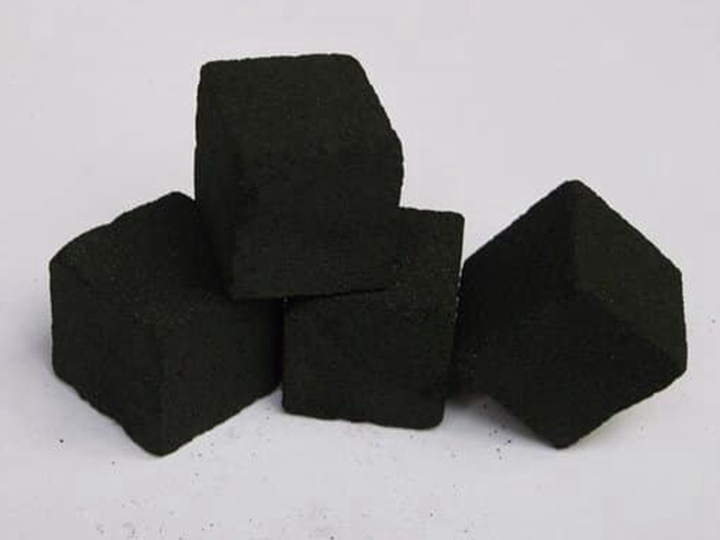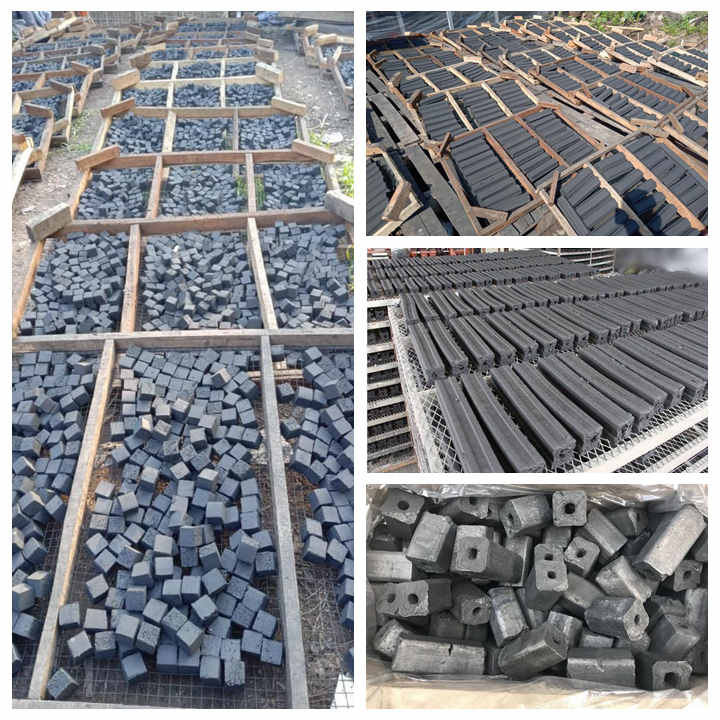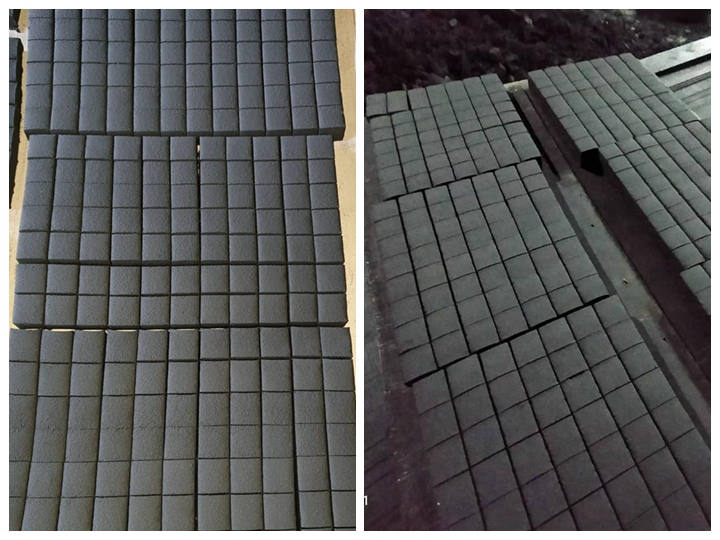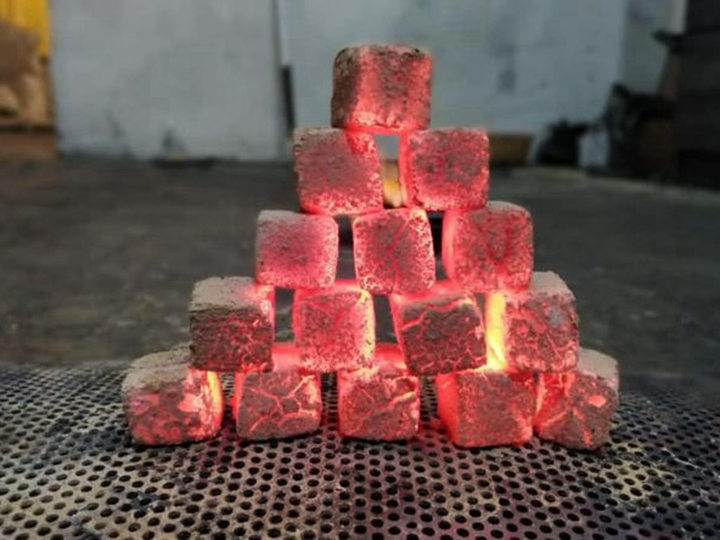Arang adalah sejenis bahan bakar energi terbarukan yang berasal dari limbah. Ia memiliki nilai kalori yang lebih tinggi dibandingkan arang dari bahan baku serupa. Ia tidak mengeluarkan asap, tidak berasa, tidak beracun, bersih, dan higienis. Ia dapat digunakan secara luas untuk pemanasan di rumah. Makanan panggang sangat diminati di pasar internasional. Dalam industri, ia dapat menggantikan batu bara atau boiler uap yang menggunakan minyak berat dan juga dapat digunakan sebagai bahan baku kimia untuk pengolahan mendalam karbon aktif dan silikon karbida. Silikon kristalin, dll. Ia adalah bahan baku penting untuk pabrik karbon disulfida, pabrik racun nyamuk, pabrik bahan peledak, pabrik pengolahan tembaga, dan pengecoran.

Aplikasi industri
- Digunakan untuk melebur logam non-ferrous berkualitas tinggi dan besi cor.
- Digunakan sebagai agen pengkarburasi untuk bagian mekanis untuk meningkatkan kekerasan permukaan dan ketahanan aus bagian baja.
- Siapkan bubuk mesiu dengan kalium nitrat dan belerang.
- Ini dapat diubah menjadi grafit. Digunakan sebagai pelumas padat, yang sangat penting untuk bagian yang berputar yang tidak dapat dilumasi (menggunakan grafit sebagai bantalan geser). Sebagai elektroda grafit.
- Setelah karbon aktif digunakan, akan lebih banyak digunakan dalam bidang kimia, farmasi, perlindungan lingkungan, dan aspek lainnya. Seperti pemurnian bahan kimia, pemurnian zat berbahaya dalam air dan udara minum, serta pembuatan masker gas.
- Arang buatan mesin yang terbuat dari batang jagung dan batang padi memiliki kandungan yodium sebesar 500 mg/g, yang mendekati indeks karbon aktif industri. Ini dapat digunakan untuk pengendalian polusi dan dapat secara signifikan mengurangi biaya.

Penggunaan pertanian
- Meningkatkan suhu tanah: Setelah bubuk arang diterapkan ke tanah, partikel arang hitam menyerap panas matahari, yang dapat meningkatkan suhu tanah beberapa derajat Celsius dan mendorong perkecambahan biji. Secara khusus, ini dapat mendorong perkecambahan biji yang sulit untuk berkecambah dan meningkatkan tingkat perkecambahan.
- Meningkatkan kualitas tanah: Setelah bubuk arang diterapkan ke tanah, bakteri rizosfer dapat terbentuk di permukaan arang, sehingga membentuk tanah pertanian yang cocok untuk budidaya tanaman, menghindari apa yang disebut "hambatan budidaya berkelanjutan"; dan arang memiliki efek pada pertumbuhan, warna, dan rasa biji-bijian, kacang-kacangan, dan sayuran. Semua telah meningkat.
- Pertahankan kelembapan tanah: Ketika kelembapan relatif di atas 50%, arang dapat dengan cepat menyerap sekitar 20% air dan dapat digunakan untuk mempertahankan kelembapan tanah. Pada saat yang sama, ia juga dapat meningkatkan permeabilitas udara dan drainase tanah, serta menyediakan ruang hidup yang baik bagi mikroorganisme yang bermanfaat bagi tanaman.
- Agen pelepasan lambat untuk pestisida atau pupuk: Kapasitas adsorpsi arang digunakan untuk menjaga keseimbangan antara pestisida dan pupuk organik. Dengan menggunakan keseimbangan ini, pestisida atau pupuk dapat dilepaskan secara perlahan dalam waktu yang lama, dan tidak mudah hilang akibat hujan.

Penggunaan peternakan
- Arang memiliki fungsi menyerap bau. Ini dapat menghilangkan bau, memperbaiki lingkungan hidup ternak dan unggas, serta mendorong pertumbuhan ternak dan unggas.
- Arang juga memiliki fungsi untuk meningkatkan daya cerna ternak dan unggas. Menambahkan sedikit bubuk arang ke dalam pakan dapat mempercepat pertumbuhan dan perkembangan ternak dan unggas serta meningkatkan kualitas daging dan susu.
- Gunakan 90 gram bubuk arang, 60 gram garam goreng, dan 30 gram akar manis.
- Diare yang disebabkan oleh gangguan pencernaan atau air minum yang tidak bersih dapat diberi 3% bubuk arang dalam diet.
Tujuan hidup

- Orang sering menggunakan arang untuk pemanasan, memanggang, dan shabu-shabu. Karena tidak mengeluarkan asap, nilai kalori yang tinggi, dan waktu pembakaran yang lama, arang semakin populer.
- Ada banyak lubang di arang. Lubang-lubang ini berfungsi untuk mengadsorpsi berbagai zat dan melepaskan zat yang teradsorpsi. Oleh karena itu, orang menggunakannya sebagai dehumidifier. Ketika basah, arang akan menyerap kelembapan, ketika kering, ia akan melepaskan kelembapan yang teradsorpsi, sehingga berperan sangat baik dalam mengatur kelembapan. Selain itu, arang juga dapat menghilangkan bau dan zat berbahaya di dalam ruangan.
- Porositas arang tidak hanya dapat menyimpan air yang dibutuhkan oleh akar tanaman, tetapi juga meningkatkan permeabilitas udara dan drainase tanah, serta menyediakan ruang hidup yang baik bagi mikroorganisme yang bermanfaat bagi tanaman. Oleh karena itu, tambahkan 5% arang, yang berukuran 10% dari ukuran biji, dapat memberikan lingkungan pertumbuhan yang sehat bagi tanaman; sementara pohon taman meningkatkan kemampuan untuk melawan hama dan penyakit.
- Konsep dekorasi saat ini mulai memperhatikan karakteristik perlindungan lingkungan, alam, kesehatan, dan kemanusiaan. Arang dekoratif menggunakan ruang pori kecil untuk menumbuhkan bonsai yang subur dengan segenggam tanah.
- Arang dapat membantu mengawetkan makanan. Gunakan sebagai deodoran di lemari es.
